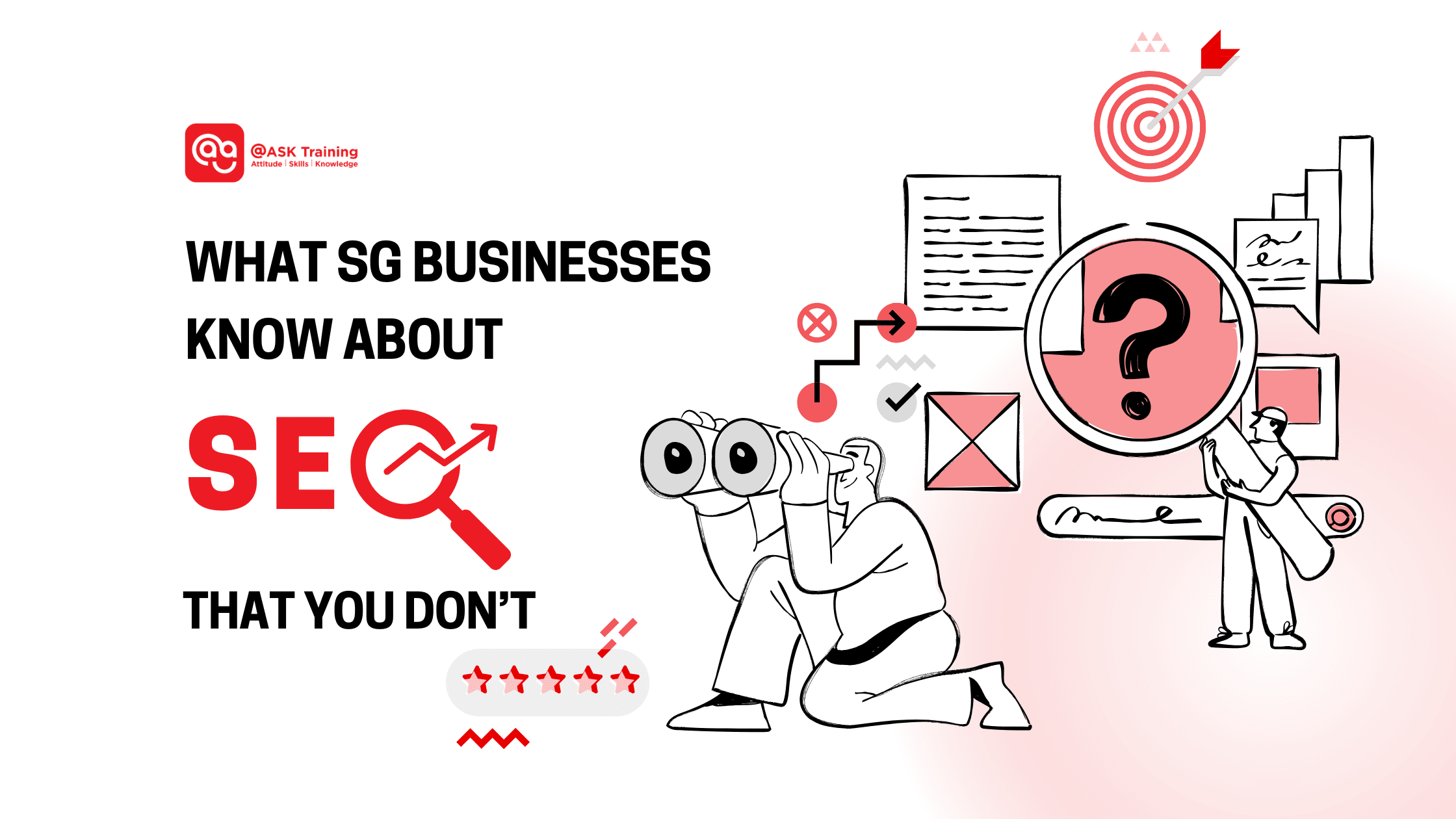
In today’s fast-paced digital age, where information is readily accessible at our fingertips, businesses in Singapore must adapt to the evolving online landscape.
Search Engine Optimisation (SEO) is a strategic approach that can significantly enhance your online visibility and drive targeted traffic to your website.
Why SEO Matters for Singaporean Businesses
As a Singaporean business owner or marketer, you understand the fierce competition in the local market. To stay ahead, you need to ensure your business is visible to potential customers online. SEO can help you achieve this by:
- Increasing Your Online Visibility: Improve your website’s ranking on search engine results pages (SERPs) to attract more organic traffic
- Targeting the Right Audience: Reach potential customers actively searching for your products or services.
- Building Brand Credibility: Establish your brand as a trusted authority by appearing on the first page of search engine results.
In this article, we will explore further how businesses can utilise SEO to their advantage and stay ahead of the competition.
How SEO Increases Traffic & Visibility
SEO is the process of optimising your website to rank higher in search engine results pages (SERPs). When your website appears higher in the search results, it attracts more organic traffic, leading to increased brand visibility and potential customers.
Here’s an example:

Imagine you own a bakery in Singapore. When someone searches for “best bakery in Singapore” on Google, you want your bakery to appear at the top of the search results. By implementing effective SEO strategies, you can achieve this goal.
How SEO Increases Website Visibility:
Keyword Optimisation
By identifying and incorporating relevant keywords into your website’s content, you can improve your website’s visibility for specific search queries. Here’s how:
- Identify Relevant Keywords: Use tools like Google Keyword Planner to find relevant keywords that your target audience is searching for. By targeting relevant keywords, your website becomes more visible to users searching for specific products or services
- Optimise On-Page Elements: Incorporating keywords into titles, meta descriptions, headers, and content helps search engines understand the topic of your page and rank it accordingly.
Backlink Building
Building high-quality backlinks from other reputable websites can significantly boost your website’s authority and ranking. Here’s how:
- Guest Posting: Write high-quality guest posts on other relevant websites to earn valuable backlinks. By publishing high-quality content on other reputable websites, you can earn valuable backlinks that direct traffic to your website.
- Outreach: Reach out to other website owners and bloggers to request backlinks. Building relationships with other websites and bloggers can lead to valuable backlinks and increased visibility.
Technical SEO
Optimising your website’s technical aspects, such as website speed, mobile-friendliness, and site structure, can improve your website’s performance and search engine ranking. Here’s how:
- Website Speed: Optimise images, minimise HTTP requests, and leverage browser caching to improve your website’s loading speed. A faster website improves user experience and search engine rankings.
- Mobile-Friendliness: Ensure your website is mobile-friendly and responsive to different screen sizes, which is crucial for search engine rankings.
- Site Structure: Create a clear and logical site structure with easy-to-navigate menus and internal linking. This makes it easier for search engines to crawl and index, making it more likely to appear in search results.
- XML Sitemap: Submit an XML sitemap which helps search engines discover and index all the important pages on your website.
By combining these strategies, you can significantly improve your website’s visibility and attract more organic traffic.
Local SEO: A Spotlight on Local Businesses
Local SEO in Singapore is essential for businesses to attract local customers. By optimising your website for local search queries, you can:
- Improve Local Search Rankings: Rank higher in Google Maps and local search results for relevant keywords like “best restaurants in Singapore” or “plumber in Jurong”.
- Attract Nearby Customers: Target customers within a specific geographic area, such as a neighbourhood or district.
- Enhance Online Reviews: Encourage customers to leave reviews on Google Business Profile (Google My Business) to boost your local search ranking.
By combining strong SEO and local SEO strategies, Singaporean businesses can significantly increase their online visibility and attract more local customers.
Now that we’ve explored how SEO can boost your online visibility and drive traffic, let’s discuss the financial benefits of SEO.
The Cost-Effectiveness of SEO
While paid advertising can provide quick results, SEO offers a more sustainable and cost-effective approach to digital marketing. Investing in SEO can help Singaporean businesses reap long-term benefits including:
- Reduce Marketing Costs: Organic traffic generated through SEO is free, unlike paid advertising, which requires ongoing expenses.
- Increase Brand Visibility: Consistent SEO efforts can lead to long-term brand visibility and recognition.
- Improve User Experience: A well-optimised website can enhance SEO and user experience, leading to higher engagement and conversions.
Avoiding the Pitfall of Underinvesting in SEO
To maximise the benefits of SEO, it’s crucial to avoid underinvesting in this strategy. Here are some tips to prevent this common pitfall:
- Allocate a Dedicated Budget: Set aside a specific budget for SEO activities, including content creation, link building, and technical SEO.
- Hire SEO Experts: Consider hiring experienced SEO professionals to handle your SEO strategy.
- Monitor and Measure: Track your website’s performance using analytics tools to measure the impact of your SEO efforts.
- Stay Updated with SEO Trends: Keep up with the latest SEO trends and algorithm updates to stay ahead of the competition.
By prioritising SEO and implementing effective strategies, you can reap the rewards of increased online visibility, higher organic traffic, and sustainable growth.
Let’s explore how SEO can improve the user experience on your website.
SEO Improves User Experience
A well-optimised website not only ranks higher in search engines but also provides a seamless user experience. By focusing on factors like website speed, mobile responsiveness, and user-friendly navigation, you can significantly improve user engagement and retention.
Key Factors for a Better User Experience
Website Speed
- A fast-loading website is crucial for user satisfaction. Optimise images, minimise HTTP requests, and leverage browser caching to improve your site’s speed.
- Example: If your website takes more than a few seconds to load, users may abandon it and go to a competitor’s site.
Mobile-Friendliness
- With the increasing number of mobile users in Singapore, it’s essential to have a mobile-friendly website.
- Google prioritises mobile-friendly websites in search rankings, so optimising your website for mobile devices is crucial.
- Example: Ensure your layout adapts to different screen sizes and that all content is easily readable on mobile devices.
User-Friendly Navigation
- A clear and intuitive navigation structure helps users find the information they need quickly and easily.
- Use clear and concise labels for menus and navigation links.
- Organise your website’s content logically and hierarchically.
- Example: A fashion e-commerce website could have main categories like “Women’s Wear,” “Men’s Wear,” and “Accessories,” with subcategories for each.
High-Quality Content
- Create high-quality, informative, and engaging content that addresses your target audience’s needs.
- Use clear and concise language, and avoid jargon.
- Optimise your content with relevant keywords to improve search engine visibility.
- Example: A tech blog could write articles on “How to Set Up a Home Wi-Fi Network” or “Best Smartphones in Singapore 2023.”
Here’s an easy-to-follow summary to improve your SEO and user experience:
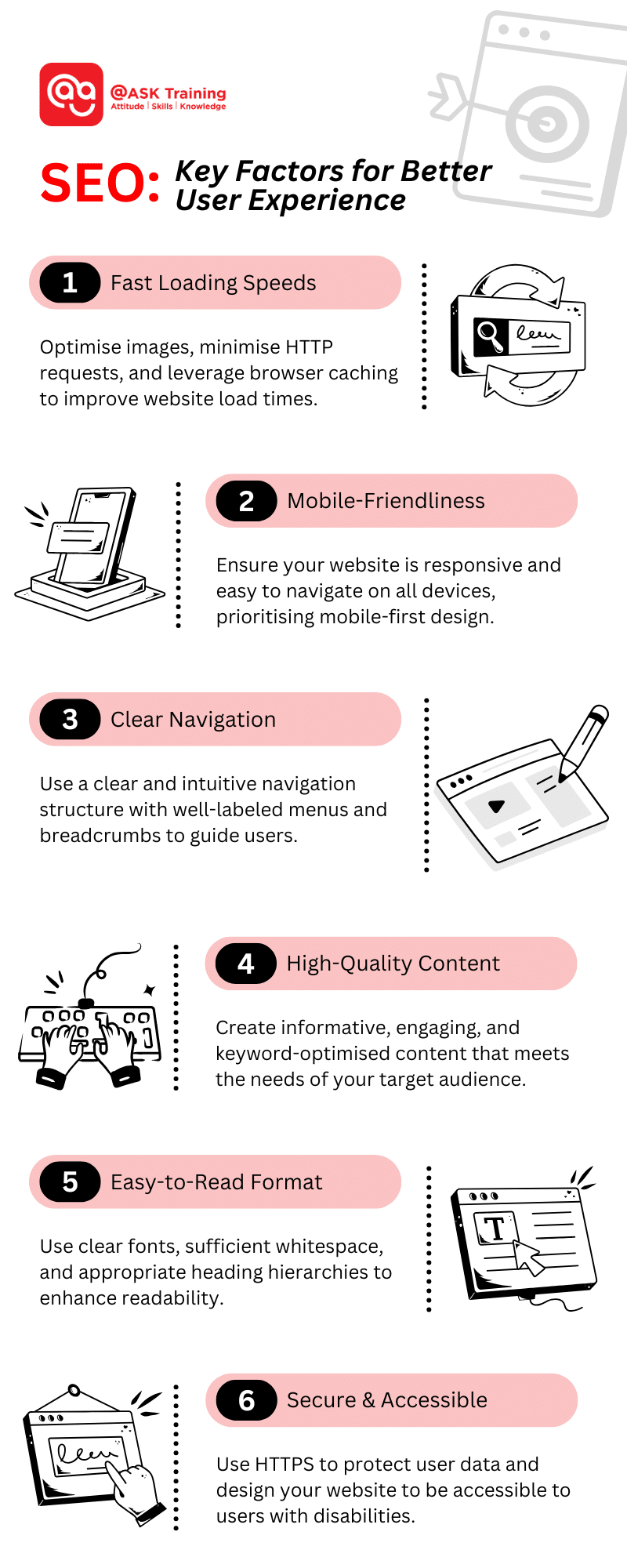
A/B Testing and Conversion Rate Optimisation (CRO)
To further enhance user experience and drive conversions, consider using A/B testing and CRO techniques.
- A/B Testing: Test different variations of your website’s elements—such as headlines, button text, and call-to-actions—to identify the most effective version.
- CRO: Optimise page elements to improve conversion rates. For example, experiment with headline variations, button placements, and form fields to increase sign-ups or sales.
By prioritising user experience and implementing effective SEO strategies, you can create a website that attracts and retains visitors, ultimately driving business growth.
SEO for SMEs in Singapore
Now let’s dive into how SEO can specifically benefit small and medium-sized enterprises (SMEs) in Singapore.
Even if you’re a small business owner, SEO can level the playing field. By implementing the following strategies, you can compete with larger businesses and attract a loyal customer base.
Here are some tips for SMEs to start building an effective SEO strategy on a budget:
Optimise Your Google Business Profile
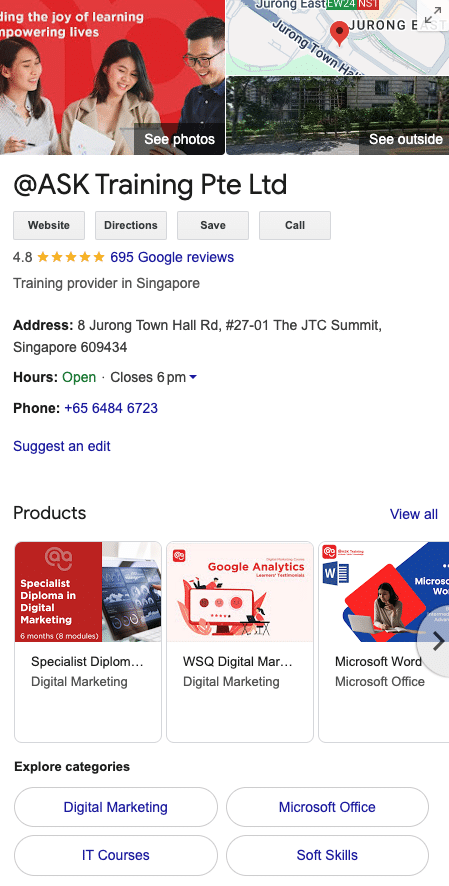
- Complete your profile with accurate information, including business name, address, phone number, and business hours.
- Encourage customers to leave reviews to improve your local search ranking.
Utilise Local Keywords
- Identify relevant local keywords and incorporate them into your website’s content, titles, and meta descriptions.
- Use local keywords in your blog posts, social media posts, and other online content.
Engage on Social Media
- Use social media platforms to connect with your target audience, share valuable content, and drive traffic to your website.
- Respond to comments and messages promptly to build relationships with your followers.
Build High-Quality Backlinks
- Build relationships with other businesses and bloggers to earn backlinks to your website.
- Guest posting on other websites is a great way to build backlinks and increase your website’s authority.
By implementing these strategies, SMEs can effectively compete with larger businesses and achieve sustainable growth.
Staying Competitive Through SEO
Staying ahead of the curve is crucial for long-term success. SEO is an ongoing process, and consistent effort is key to maintaining your competitive edge.
Let’s explore how you can use SEO to stay competitive:
Maintaining Search Engine Visibility
SEO helps your business stay visible in search results, ensuring potential customers can find you online. By continuously optimising your website and content, you can maintain your ranking and attract organic traffic.
Learning From Your Competitors
Understanding your competitors’ SEO strategies can be a valuable tool. Consider using industry-leading SEO analysis tools like SEMrush or Ahrefs to:
- Identify your competitors’ top keywords: Analyse the keywords your competitors are ranking for and consider incorporating relevant ones into your strategy.
- Discover their backlink profile: Backlinks play a significant role in SEO. Analysing competitor backlink profiles can reveal potential link-building opportunities.
- Track their content strategy: See what kind of content competitors create and what performs well. Use the insights to shape content that better serves your audience.
Remember, imitating isn’t the goal. Use competitor analysis to gain insights and adapt them to fit your unique brand and target audience.
Staying Agile: Adapting to Algorithm Changes
Search engine algorithms are constantly evolving, so staying updated on the latest changes is crucial. Regularly monitor SEO trends and algorithm updates to ensure your website remains optimised.
Here are some steps to maintain your SEO efforts over time:
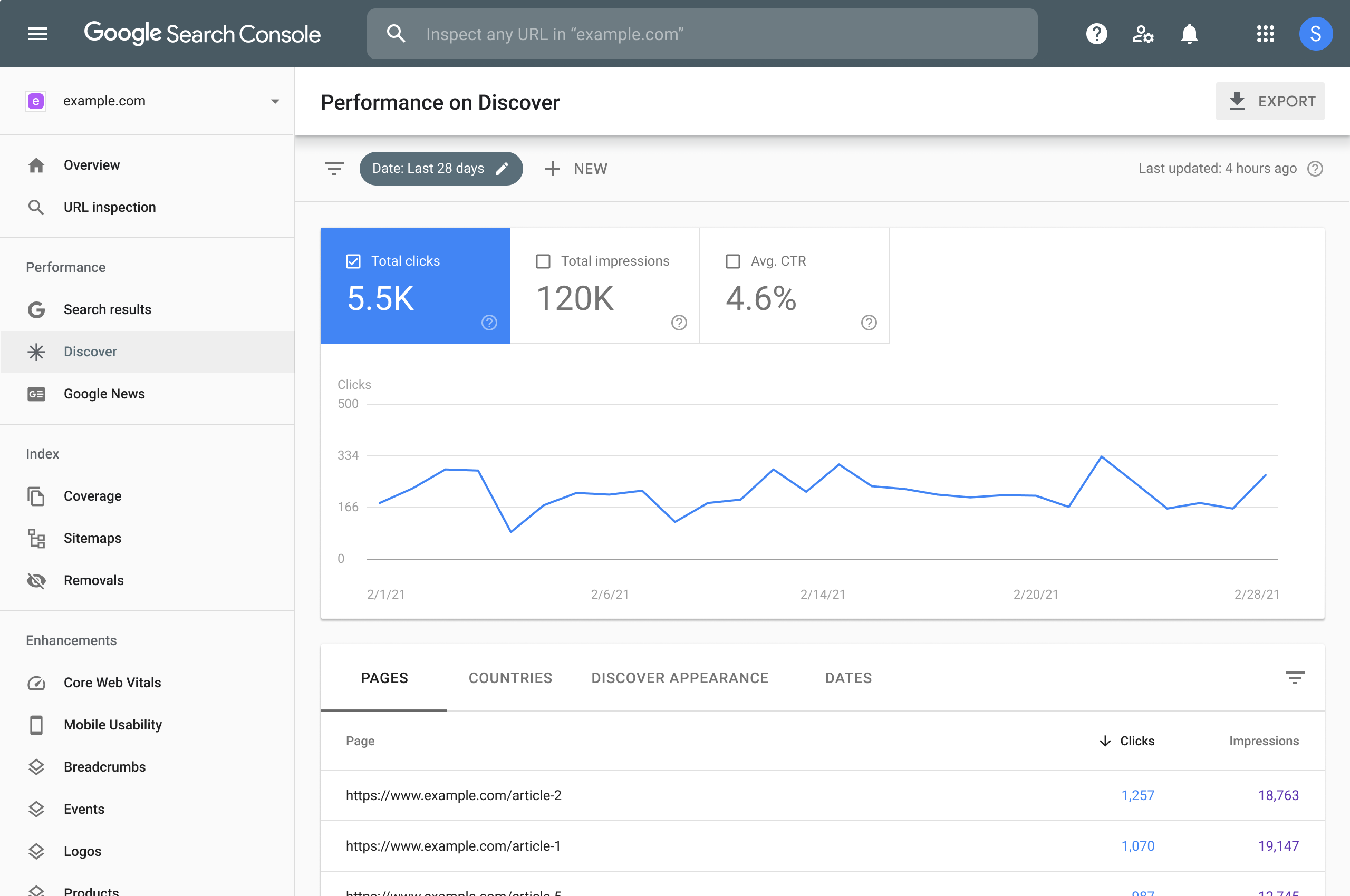
- Continuously monitor your website’s performance: Use analytical tools like Google Search Console to track traffic, keyword rankings, and user behaviour.
- Stay informed about SEO trends: Subscribe to reputable SEO blogs and publications to keep up with best practices.
- Regularly audit your website: Run periodic SEO audits to identify improvements in technical SEO, content performance, and overall optimisation strategy.
Here are valuable resources to help you monitor the latest trends and algorithm updates:
Monitoring Tools and Alerts:

- Google Alerts: Set up alerts for keywords like “Google algorithm update” to receive timely notifications in your inbox.
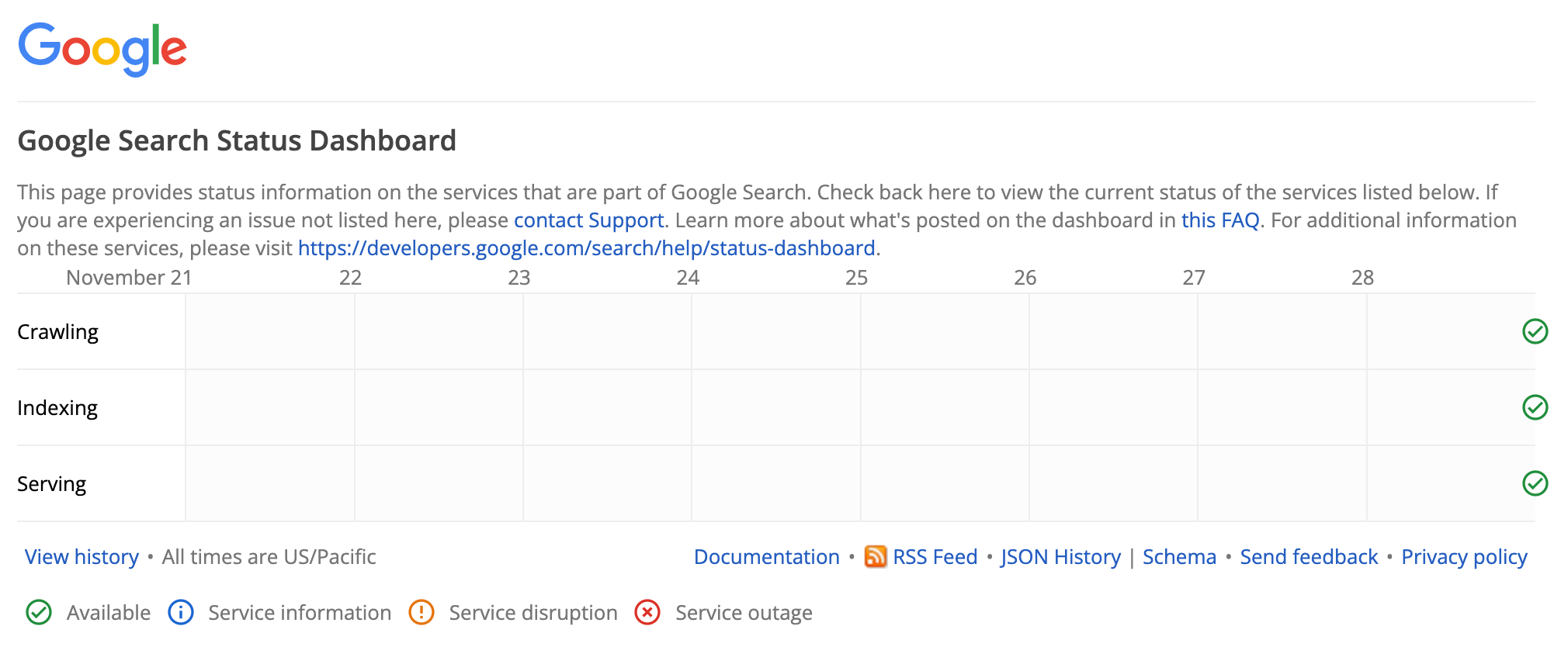
- Google Search Status Dashboard: Official updates on indexing, crawling, and algorithm changes. Subscribe to the RSS feed for real-time notifications.
SEO Blogs and Newsletters:
These resources offer in-depth analysis, expert insights, and reports on significant algorithm changes, explaining their potential impact on your SEO strategy.
Tools for Tracking Algorithm Changes:
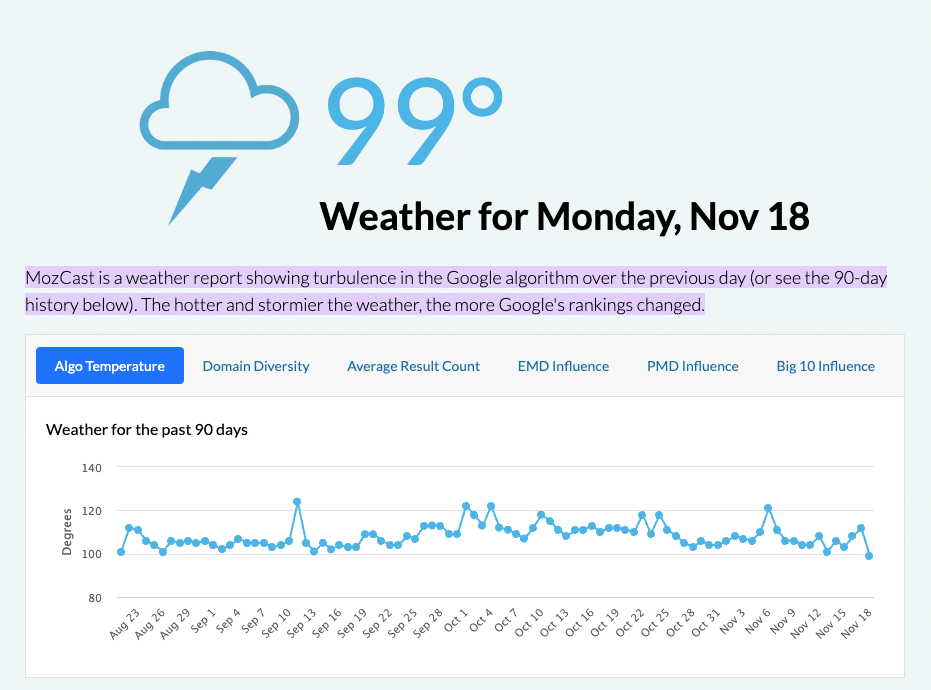
- MozCast: Tracks search result volatility, like a weather report for SEO.
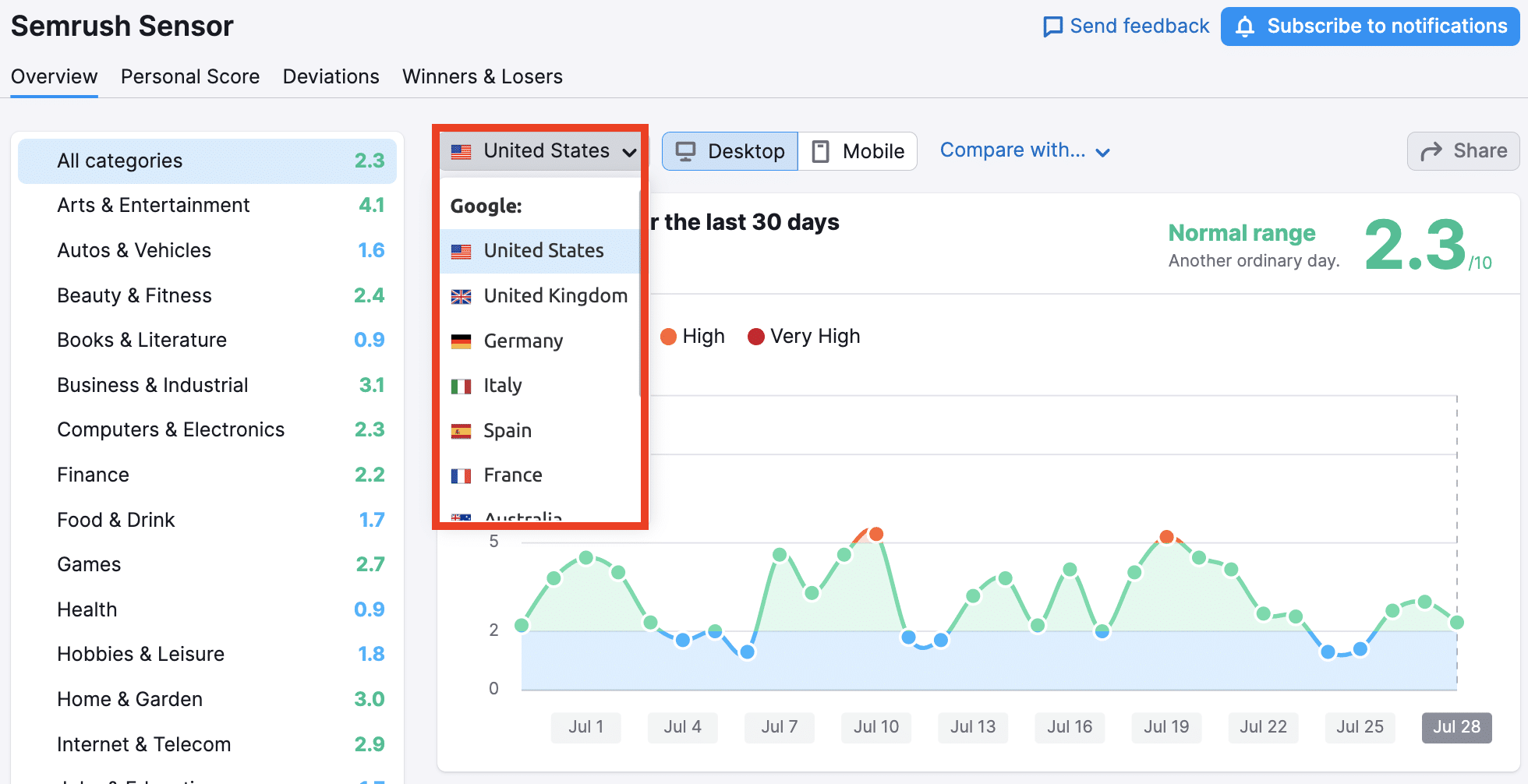
- Semrush Sensor: Tracks daily changes in SERPs by industry and surfaces ranking shifts after major updates.
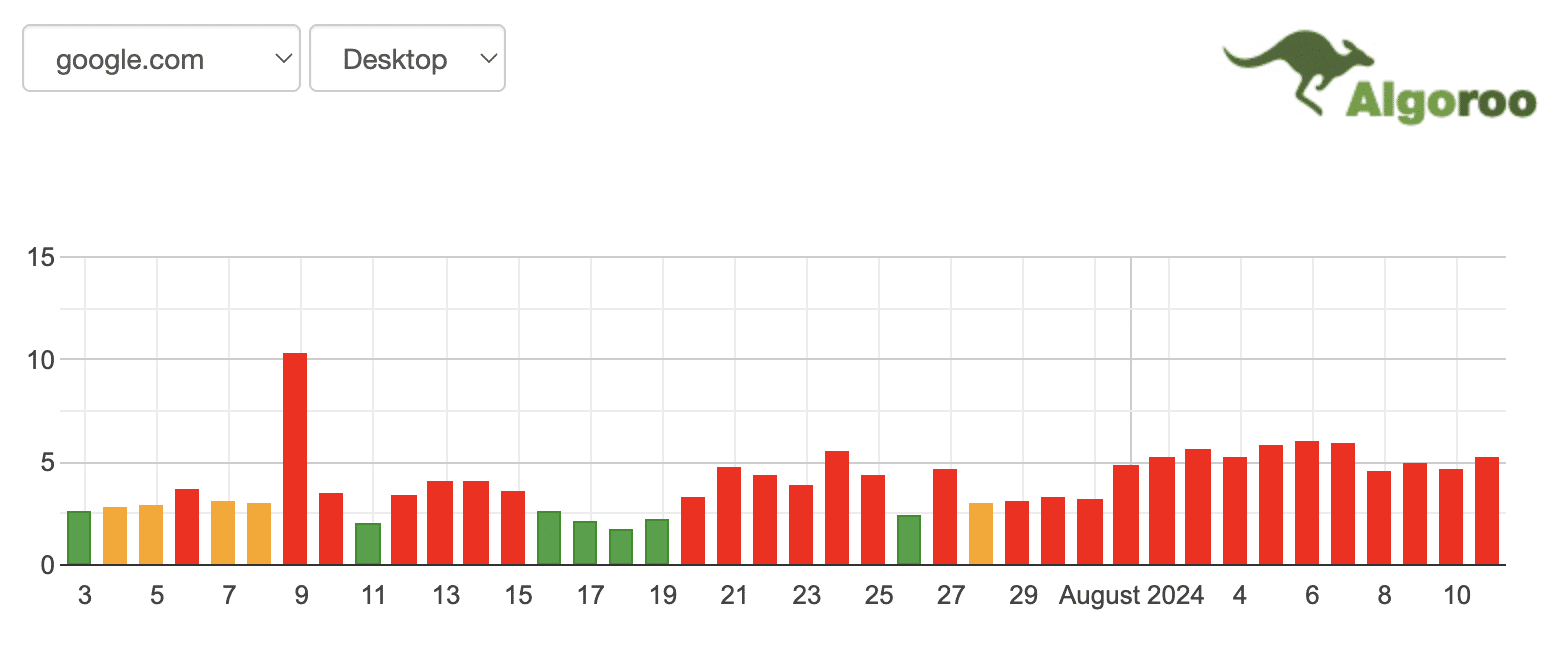
- Algoroo: Monitors SERP volatility and provides a score indicating the level of change to help gauge update impact.
Actively monitoring your SEO performance and adapting to changing algorithms will ensure your website remains competitive in the long run!
As Singapore’s digital landscape continues to evolve, SEO strategies will need to adapt to keep pace. In the next section, we’ll get a glimpse into the future of SEO and how Singaporean businesses can stay ahead of the curve.
The Future of SEO in Singapore’s Digital Landscape
The world of SEO is constantly changing, and new trends are emerging all the time. Here are a few key areas to watch in Singapore:
Voice Search
With the rise of voice assistants like Google Assistant, Alexa, and Siri, voice search optimisation will become increasingly important. Create content that matches natural-language queries and spoken-word searches.
A practical example:
Local SEO
- Optimise your Google Business Profile listing to appear in local voice search results.
- For example, a Singaporean restaurant could optimise for queries like “best seafood restaurant in Clarke Quay.”
Natural-Language Keywords
- Use conversational phrases in your content. Instead of “cheap phone repair Singapore,” consider “Where can I fix my broken phone screen in Singapore?”
Artificial Intelligence (AI)
AI will play a growing role in SEO—accelerating keyword research, content creation, and competitor analysis. Consider integrating AI tools into your workflow to stay competitive.
How Singaporean businesses can utilise AI for SEO:
AI-Driven Content Creation
- Use tools like Jasper.ai or Copy.ai to generate content ideas, outlines, and drafts.
- Analyse on-site behaviour to offer tailored content and personalised product suggestions.
Predictive Analytics
- Leverage AI to analyse behaviour patterns and predict emerging topics—then align your editorial calendar accordingly.
- Discover new keywords and themes that map to your business goals.
Automating SEO Tasks
- Adopt AI-powered tools to spot and fix technical issues (broken links, slow load times, mobile usability), and to analyse backlink profiles for new opportunities.
Staying Ahead of the Curve in SEO
To keep your strategy effective over time, it’s crucial to:
- Continuously learn: Follow trusted sources such as the Google Search Central Blog, Search Engine Journal, and the HubSpot Blog.
- Embrace new technologies: Test and adopt emerging SEO tools and workflows.
- Monitor and adapt: Track performance and refine tactics based on the latest trends and data.
Avoiding SEO Pitfalls
Don’t let your efforts fall behind—avoid these common mistakes:
- Neglecting your website: Publish fresh content regularly and optimise for new behaviours like voice search.
- Ignoring algorithm updates: Stay informed and adjust your strategy when rankings or SERPs shift.
- Failing to track results: Use analytics to measure performance and make data-driven decisions.
By staying informed and proactive, Singaporean businesses can ensure their SEO strategies remain effective well into the future.
Wrapping Up
By prioritising SEO, Singaporean businesses can unlock their full potential and thrive in today’s competitive digital market. In this guide, we’ve explored how SEO empowers growth across visibility, credibility, UX, and marketing efficiency.
SEO helps you:
- Increase website visibility: More organic traffic drives brand awareness and customer acquisition.
- Build brand credibility: High rankings signal authority and trust.
- Improve user experience: A fast, usable, and relevant site boosts engagement and conversions.
- Support your wider marketing: SEO compounds returns across all channels.
Don’t Wait, Take Action!
Start implementing effective SEO strategies today and monitor your results. Check out @ASK Training’s SEO, Website Analytics and Optimisation courses including:
- WSQ Search Engine Optimisation Course
- WSQ Advanced Search Engine Optimisation Course
- WSQ Website Landing Page and Optimisation Course
Equip your team with the skills to earn superior rankings and unlock long-term growth in Singapore’s digital landscape. Reach out to learn more about available funding and start your SEO journey!
Related Courses
- SEO, Website Analytics and Optimisation Courses
- WSQ Search Engine Optimisation (SEO)
- WSQ Advanced Search Engine Optimisation (SEO)
◆◆◆
